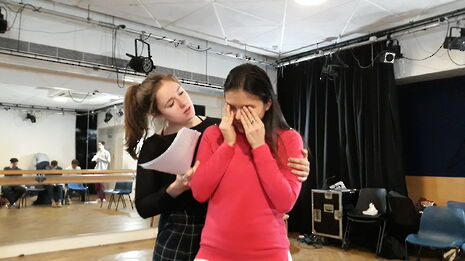After Juliet preview: ‘sensitivity and complexity’
This intimate and cyclical play continues the story of Shakespeare’s most famous protagonists – but not in the way you might expect

Once upon a time in fair Verona, Romeo and Juliet lived, loved and died, leaving in their wake two grieving families and a violent feud only tentatively resolved. So what happened next?
This is the central question posed by After Juliet, which follows the young Capulets and Montagues as they try to pick up the pieces following the tragic, traumatic events of Shakespeare’s original play. Forced to discard their weapons by Prince Escalus, yet still the same frustrated, bored teenagers as before, they each grapple with the sense of displacement and disaffection they feel in the confusing, postlapsarian world they now find themselves in.
With Shakespeare’s two most famous protagonists dead, playwright Sharman Macdonald shifts the spotlight onto Juliet’s cousin Rosaline, played by a fittingly sardonic Mary Butler. Rosaline, devastated by Romeo’s death (she was his first crush before Juliet entered the picture), seethes with bitter resentment – director Maddy Trépanier highlights the possible feminist readings of her character: Rosaline seems to be saying, “I’m just as crazy, disruptive, neurotic, obsessive, as any man – watch what I can do.”
It’s worth noting that Rosaline never actually appears on stage in the original play, and Trépanier is keen to stress that After Juliet “isn’t trying to directly continue the story in the way the audience might expect”. In fact, the script draws more from Romeus and Juliet, a 1562 narrative poem which Shakespeare used as a source. This production actually opens with the prologue from that poem, delivered alongside eerie fingerpicked guitar by a mysterious street musician (Freddie Bartlett-Evans) who doubles as a spectral version of Romeo. “The prologue leads the audience in through this familiar gateway,” Trépanier notes, “because it functions very much like the prologue from Romeo and Juliet – but it makes clear that, actually, this is not the Shakespeare you thought you were getting: this is something different”.
Indeed, despite its Renaissance source material, Macdonald’s script is profoundly anachronistic, interspersed throughout with modern colloquialisms, constantly mixing poetry with profanity. In the scene I watch them rehearse, Lorenzo (Oscar Williams) casually tells a quizzical Gianni (Archie Williams) that “the earth is holding its breath”. This thought hangs in the air between them, seeming to teeter on the edge of some profound revelation – only to be cut short with a brusque “fuck off”.

These anachronisms are funny, but they’re also disorienting; Trépanier wants the audience to “feel like they’re in a world which they once understood, but has since been subverted – which is essentially what the characters are feeling as well”. The production team have expanded on this anachronistic aesthetic by mixing the 16th century Italian setting with elements from 1950s post-war Italy. That period, much like the aftermath of Romeo and Juliet’s suicides, is one in which society is supposed to be evolving, yet all the old structures are still in place, and no-one knows quite what they’re supposed to do with themselves any more.
There’s a cyclical quality to the play which both Trépanier and Assistant Director Tom Nunan draw attention to. Macdonald’s script makes heavy use of repetition, and it seems as if the characters are just going in circles: “there’s an inconclusive, ambiguous tone throughout,” emphasises Nunan, “and it does feel like you’re always circling round the point, but none of the characters ever quite address it”. This circularity extends to the actors themselves – much of the blocking is rotational, having the actors literally circling around each other, and Trépanier amusedly recounts a moment in rehearsal where an accidentally skipped line led to a two-minute spiral of confusion as the actors scrambled to find their places again.
In one particularly telling scene, a fragile, frightened Bianca (Jasmin Thien) cries, “I need… I need…” – but she’s unable to complete the sentence, finally resolving to a vague, incomplete “…something”. There’s a real sense of longing throughout the play, characters who are desperate for something more, yet unable to escape the morass of confusion and dissatisfaction they find themselves being sucked into. With a cast and crew who are deeply intuitive to that feeling of desperation, and are able to convey it with sensitivity and complexity, After Juliet is a show that’s well worth your time.
After Juliet is on at the Corpus Playroom 6-10 March
 News / Uni Scout and Guide Club affirms trans inclusion 12 December 2025
News / Uni Scout and Guide Club affirms trans inclusion 12 December 2025 News / Cambridge study finds students learn better with notes than AI13 December 2025
News / Cambridge study finds students learn better with notes than AI13 December 2025 News / Cambridge Vet School gets lifeline year to stay accredited28 November 2025
News / Cambridge Vet School gets lifeline year to stay accredited28 November 2025 Science / Did your ex trip on King’s Parade? The science behind the ‘ick’12 December 2025
Science / Did your ex trip on King’s Parade? The science behind the ‘ick’12 December 2025 News / Pembroke to convert listed office building into accom9 December 2025
News / Pembroke to convert listed office building into accom9 December 2025








